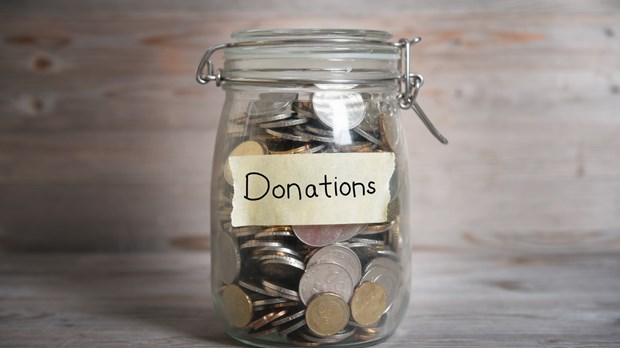Living Generously in a Greedy World

A friend forwarded me the email with her own note attached: "You know you want it!" The email invited me to act quickly: a one-day, 75 percent off sale on a famous designer's purses. I scrolled through the email and despite the fact that I was not in the market for a purse that cost triple-digits, I found myself thinking . . . I do want that!
Greed is sneaky. Greed is insidious. Greed disguises itself in many forms. Greed tells us "you must have that," but also "you must grip tightly to that." Whether coveting something we don't have or holding tightly to what we do have, greed eventually transforms us into stingy people. Stingy causes us to live closed-off lives where we want to possess rather than steward, to hoard rather than give. When you see stingy, you know it. Stingy is ugly.
So how do we identify greed in our own lives and communities? How does God instruct us to understand and respond to greed? And how do we pry our heart's fingers off the things that seem so important and open our hands to the gifts God desires to give us (that don't come in the form of designer handbags?) Let's look at how we struggle with stingy—and how God wants to free us from it:
Me? Greedy?
Can you name one person who readily admits to a problem with greed? We may admit to insecurity and worry and even anger, but it's the rare woman who can honestly assess her deep desires to own—to gather more possessions or power for herself. Perhaps you are already arguing internally about whether you are greedy or generous:
But I do like to give away money . . .
But my husband is the one in charge of the finances . . .
But I'm just a saver . . . .
But . . . .
Greed is most powerful when we are deceived by it. So how do you know if you are in control of your possessions, or if your possessions are controlling you? Here are a few questions to help you gauge the extent to which greed is affecting you:
- Have you ever thought, "If I only had that (material thing), I'd be happy?"
- Has something that was not a necessity felt more like a real "need"?
- Have you ever felt a deep emptiness inside, and even when you try to fill it with the next thing, the emptiness quickly returns?
Feeling a little uncomfortable? Perhaps greed isn't so sneaky after all—maybe it's an everyday issue with deep implications for all of our lives. When we struggle with greed, we desire to hold tightly to what we do have and seek to possess what we don't yet own. Greed is an "umbrella" sin, says author Peter Kreeft: a desire to make something that should be a "means" into the "end." Andy Stanley puts it another way, saying that people struggling with greed have "bought the lie that 'my stuff is my life.'"
Us? Greedy?
Greed isn't just a personal issue. It's a cultural reality lauded as a virtue as much as a vice.
There's a commercial on TV that captures the heart of our love/hate relationship with greed. It begins, "We all love our devices . . . until we see the new one." In the commercial, people ride an escalator blissfully checking their cell phones, but they become distracted and discontent when they see the "next new thing" that the person has riding the opposite escalator. It's likely that commercial could be followed by an almost-opposite message also celebrated in our culture: consumer charity. It's "in fashion" to be generous, so smart companies try to assuage our greed by making us feel good about spending. On a recent trip to New York City, I went into a store selling T-shirts to support a philanthropy. The T-shirt cost more than $50. It wasn't clear how much of that would actually make it to the charity . . . but the company did a great job making it feel really good to spend a lot!
We are a fickle, ambivalent people who are restless with our money. We are fed two lies in one mouthful: greed and generosity can co-exist—and both are good. No wonder we are deceived and confused!
A new problem?
It's easy to believe that this intense issue with greed is new; a product of a consumer culture. Yet greed does not discriminate, and has very little to do with how much money is in our bank accounts. Greed strikes poor and rich people alike, because greed isn't about what we have, it's about what we want. Greed causes the heart to constrict and grab on tightly—to both keep and covet. It doesn't matter if coveting is about a dime-store coffee mug or a designer pair of shoes. Greed says "mine" no matter what the object of its affection.
Jesus taught frequently and forcefully on greed. In Luke 12:15, he says it this way: "Watch out! Be on your guard against every kind of greed, for a man's life does not consist in the abundance of his possessions" (NIV). Jesus uses an emphatic statement: pay attention! He uses battle language: be on your guard! And he uses inclusive language: "against every kind of greed." Perhaps a greedy, covetous heart is the default mode for all of us.
Greed isn't just about possessions, either. As Jesus said: "all kinds of greed." In the Old Testament, God implores his people not to covet their neighbor's house or wife. Sometimes greed comes in the form of position and relationship—a desire to be desired. Regardless of the object of our coveting, the power of greed is in its ability for us to turn our attention away from God, while also turning our energies against one another. Greed leads to anxiety, to coveting, to comparisons. Greed makes us jealous and insecure. Greed's greatest victory is in making our highest priority our own self. Maybe that's why Jesus commanded us to find life in Him, not in our stuff.
Combating greed
So if greed affects all of us at some point, and if Jesus spoke in battle language about greed, then it stands to reason that conquering greed requires a combat plan. The ultimate weapon against greed is generosity—the giving of our material things, our energies and our very lives for others. And this is a battle worth fighting. Unlike stinginess, a generous spirit brings us into the presence of God. We begin to see him working and moving all around us. Our understanding of his mercy and grace expands, and we see the world and the people around us in new and beautiful ways. The journey to generosity may be arduous but it's well worth the fight. Here are three approaches to move from greedy to generous:
Approach #1: Perspective
Do you believe you've been blessed? To be blessed is to be given gifts that you did not deserve. Most of us believe a mix of things about our own financial standing— mostly that we earned what we have—with a little of God's blessing mixed in. We stand on our own abilities more than we'd like to admit. But if we believe what God teaches—"the earth is the Lord's and everything in it" (Psalm 24:1)—then we must remind ourselves that we don't own anything. God is the owner, provider, and sustainer of all.
We translate that into our modern lives by remembering that in this life, we are not owners, we are managers. What would it be like to consider all of your possessions and influence not as something you've earned but as something you've been given to steward well? Would you be more willing to let your youth group borrow your new minivan if you thought of it as a possession your heavenly Father has given you to manage? Would it be easier to part with that year-end bonus if you knew that God would call you to account for the way you stewarded his funds? Could you share your knowledge and influence and energy more freely? The American Dream will not remind us of this reality, so we must remind ourselves. Managers, not owners.
Approach #2: Prayer
If you are able to meet your basic needs—food, clothing and shelter—then you are living in abundance. And if God is the one who's given the extra, the first step is talking to him about your money.
It's a bold thing to open your bank account before God. A simple daily prayer might help: "God, what do you want me to do with the abundance that you've given?" Prayer opens our eyes to what God is doing all around us. Prayer makes room in our hearts for God's economy: trading greed for generosity, relying on God's provision rather than our own.
Approach #3: Act
Sometimes we break the power of greed by giving things away. Maybe it's a pair of jeans that fit just right, or boots you love. Maybe it's books. I recently heard Ally Vesterfelt, author of Packing Light, share what she learned when she sold all her books. "It turns out my books were a way that I could tell the world that I was smart and competent. Sometimes getting rid of possessions helps us discover emotional baggage." Ally discovered that when we cling tightly to things, we are often compensating for our weaknesses or fears or insecurities. Things give us false security and they help us feel like we don't need anything, or anyone, or any God. Greed teaches us who we really think is in control and what we really think matters. And when we get to the heart of that, we are already beginning to grow.
The battle against stingy
None of us sets out to live with a stingy heart. But whether it's our own deception, cultural forces or plain ol' materialism, our desires to hoard and possess plague us—until we turn our lives over to the goodness of God. To be a stingy person is to hold tightly to things and to people. Stinginess sees saving as more important than giving. Stinginess looks out for itself. Stinginess is the kid hoarding candy under the piñata. Nobody likes the kid hoarding candy under the piñata, especially when God is saying, "There are more piñatas than you can count!"
God's generosity is the ultimate weapon against stinginess. When our eyes are opened to this aspect of God's character, we begin to see his generosity everywhere—in our lives and in the lives of those that we bless with our own giving. The Message version of Proverbs 11:24 says it this way: "The world of the generous gets larger and larger; the world of the stingy gets smaller and smaller." And when you experience the freedom of the open heart of generosity, you'll never return to the small world of stingy.
Nicole Unice is a regular contributor for Today's Christian Woman, and the author of She's Got Issues (Tyndale, 2012) and co-author of Start Here: Beginning a Relationship with Jesus (David C. Cook, 2014). She is a ministry associate at Hope Church in Richmond, VA, and mom of three. Find her speaking calendar at nicoleunice.com.
Read more articles that highlight writing by Christian women at ChristianityToday.com/Women
 Read These Next
Read These Next

 Consumed by CompetitionHow an online boot camp broke down the lies that were driving my all-or-nothing life
Consumed by CompetitionHow an online boot camp broke down the lies that were driving my all-or-nothing life Money Made Easy?A conversation with Bob Russell, author of Money: A User's Manual
Money Made Easy?A conversation with Bob Russell, author of Money: A User's Manual
 The Work-Life-Faith BalanceFollowing God’s lead through all seasons of life
The Work-Life-Faith BalanceFollowing God’s lead through all seasons of life








 Homepage
Homepage
